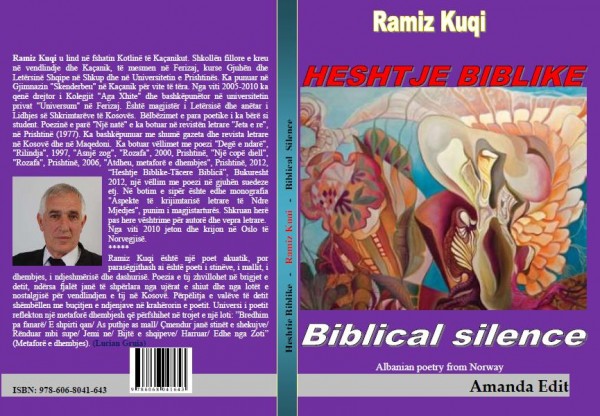
By Peter Tase
Ramiz Kuqi, a poetry writer, journalist and a literary critic from Kotline Village in the District of Kaçanik, Kosovo; pursued his elementary education at his birth place and in Kacanik, later continued his education at the high School of Ferizaj. Kuqi went to study Albanian Language and Literature at the University ofPrishtina and in Skopje Macedonia. Worked for many years at “Skenderbeu” High School in Kaçanik. From 2005-2010 was the director of Aga Xhite High School, and collaborator of “Universum” a Private University in Ferizaj.
He received a Master of Arts degree in Albanian Literature and is a member of the Kosovo League of writers. His first poetical writings came when Kuqi was a student. His first poem, “One Night” was published by the “Jeta e Re”, a journal of literature, in Prishtina, Albania, in 1977. Kuqi has been a regular contributor of many newspapers and literary magazines in Albania, Kosovo and Macedonia. He published the following volumes of poetry: “Divided Branch,” “Renaissance,” 1997, “Not a Single Bird,” 2000, “A Sun’s piece,” 2006, “Fatherland, a Metaphor of Pain,” 2012, all by the Rozafa Publishing house ofPrishtina.
“Biblical Silence” (Albanian and Romanian), is the fifth book of Ramiz Kuqi, published in Bucharest. There is also a forthcoming monograph on “Aspects of the Literary Work of Ndre Mjeda” a Master’s thesis presented by the author for his graduate studies. Kuqi has been published in the anthology “Un quenched Fire” (with a group of authors), Amanda Edit, Bucharest, 2012. Kuqi writes constantly book reviews for Albanian authors and their respective literary works. Since 2010 resides in Oslo, Norway, where he also continues to be active in writing prose and poetry.
“Biblical Silence” reinvigorates the meaning of Albanian poetry written in the diaspora by writers who grew up and recognize the abundant artistic and poetical beauty that Kosovo and Albania have for its local – international – writers. Since the time of Albanian renaissance movement in late 1800s, literature produced by Albanian diaspora has shown a great contribution towards achieving independence of Albanian nation and certainly, with persisting sacrifice and determination, winning the independence of Kosovo in February, 2008. Both of these nationally important accomplishments would not be possible without the contribution of renaissance writers such as Naim Frasheri, Jeronim De Rada and others leading up to this day, including Ramiz Kuqi, who incorporates centuries’ old style of Albanian poetry in his verses full of metaphors, national upheaval and a demonstration of his country’s natural beauty.
In his poem “I don’t know” Ramiz Kuqi writes: “Where is hiding my word today/ On which side is sleeping this metaphor/ on which river is flowing this longing/ what song/ has my fatherland composed/for a century/ I don’t know/ In what season we will be reborn/ and will kiss a flag / Will we walk bowing our heads/ over the blood’s earth / pouring in autumn and spring / I don’t know / where is my word hiding today / I don’t know. In these verses the author has knotted two fundamental elements that most of Albanian authors adore and use as the central pieces of their literary creations in poetry; those are patriotism and desire for nationhood. Although it is not explicitly expressed in his verses, the author indirectly demonstrates his dream is to see“a song composed by his fatherland.”
The words used such as ‘Song’ is perhaps the agenda that Kuqi expects from his nation’s leaders who are in charge of acquiring the independence of his land where he grew up, in this context he is anxious to see – hear – the sounds of independence, autonomy and sense of nationhood from the speaking podiums of Kosovo’s leaders. The author goes even further by raising – placing – the question to himself on “where is [his] word hiding today,” a state of mind that is only experienced by a writer, when a high level of disturbance is taking place, and in this context,Kuqi feels disturbed in not encountering the right efforts or results, by his fellow country men, towards resolving issues of nationhood in his home country.
It is not a coincidence that writers away from their motherland write even better and are more passionate than those writers living within the borders of their native land. This characteristic is also observed in the verses and prose of many writers that were instrumental in shaping the literary period of Albanian Renaissance movement in all Balkan territories.
Another important poem with a depth of longing and great sense of metaphor is Kuqi’s “Longing Verses” which are undoubtedly a showcase of his literary stile, with an influence of natural elements and daily occurrences, such as “Sun,” “Night” or “day.” There is a great need to closely analyzeRamiz Kuqi’sverses filled with emotions, longing, new age of Albanian writing style, great mysticism and double meaning of a contemporary poetry in “Longing Verses”: “I am a verse in your eyes/ You are a Sun’s longing/in a day’s kiss/ We speak Albanian/ to every night/ even when I don’t see you/ you come smiling/ just like my ridges/ with flowers decorate/ this life’s fire / verses and longing / in the sky of poetry / we sail. Sailing in the sky of poetry is the principle objective of RamizKuqithroughout all his verses, tremendously powerful content as well as his constant patriotic ideas in every given opportunity.
According to Robert Frost: “Poetry is when an emotion has found its thought and the thought has found words.” This is exactly what a genuine reader would experience while reading through the verses of Ramiz Kuqi, who in fact represents Albanian poetry at its highest levers, through incorporating in his thoughts, nature, love, sadness, skepticism, patriotism in a platform filled with metaphors.




